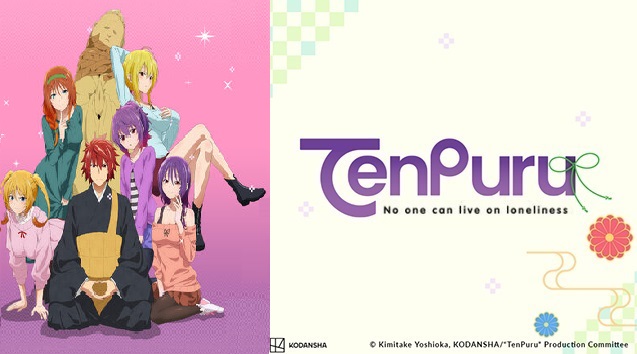English Dub Season Review: TenPuru: No One Can Live on Loneliness Season One
Based on the Japanese manga series written and illustrated by Kimitake Yoshioka. TenPuru (Or “Temple” in Japan) follows the male protagonist Akemitsu Akegami a college student trying to distance himself from his father’s lothario lifestyle, yet his father always imparted to him in his youth the words “no one can live alone”… but he’s sure determined. After all, his father sure wasn’t saying it with the best intentions, and Akemitsu had no desire to become anything like him. But when a chance encounter with a young woman leaves him with thoughts that are all too impure, he decides to do what he must—become a Buddhist monk and renounce worldly ways. But the Temple he decides to devote himself to… is full of women? And that same young woman is there, too?? What’s a guy to do?
This anime adaptation was directed by Kazuomi Koga, with scripts supervised by Yōhei Kashii, character designs handled by Masato Katsumata, and music composed by Shuntaro Innami. The opening theme song is “Bonnō Paradise” performed by Aimi, while the ending theme song is “Oidemase! Mikadzuki Tera” performed by Japanese Female voice cast Aimi, Yu Serizawa, Nanami Yamashita, Madoka Asahina, and Sumire Uesaka as their respective female characters.
With harem comedies like this, the most important aspects that often make them work are 1: it’s not censored. 2: the female leads must be likable enough for the audience to equally care about them, and 3: The Protagonist isn’t too much of an idiot. Tenpuru ticks at least two of these boxes since Akagami is a bit of an idiot, but his charm and strong convictions more than makeup for this as he’s a loveable idiot. You do get attached to the dude and want the best for him, as he tries his best to be possibly one of the few responsible adults in the place he’s staying at, but constantly falls into sexually compromising scenarios with the girls which can be funny sometimes, but can get old pretty quickly if they overstay their welcome.
The supporting cast of women is also lively diverse and flawed in different ways. Each with their personality and backstory. The anime also explores themes such as loneliness, friendship, love, and spirituality. yet all of them stay there with Akimitsu having to deal with their advances, his feelings, and the challenges of being a monk in the modern world. However, the narrative attempts a linear plot around the debt problems of the Mikazuki Temple and Akagami’s growth to be a different person from his father in later storylines, besides all its episodes sometimes being dedicated to each of the girls and to developing their personalities. but this does not mean that the show does not seek to take away the seriousness by adding comedy and entertainment in between.
The animation is colorful and detailed in some spots and gives off 2000s anime vibes, yet there is also a lot of effort and detail when focusing on the specific body parts of the characters, from the chest, and butt to the suits as extra points. However, in the rest of the occasions, where there is no fanservice but in normal scenes, the inconsistencies in the drawing are very notable, sometimes noticing that in one scene or another, the propositions of the same character are different, or equal to other girls and heavily relies on what a veteran fan already feels more comfortable with, which is watching your typical anime full of lewd “accidents” and contextualized perversions without the need for sex everywhere.
The other major problem with Tempuru is that while it’s a decent throwback to classic Anime of this genre, it doesn’t offer anything new from what we’ve already watched from any ecchi/harem. Even ecchi/harem fans could expect new ideas of fanservice or comedy from this, although series based on Buddhism are not very common to see However, Tempuru bets on what a veteran fan already feels more comfortable with, which is watching your typical anime full of “accidents”, sex jokes and contextualized perversions without going full hentai.
Overall, this felt straight out of 2011 but sometimes in the best way possible even if it stumbles in places with its contrived sex jokes. But if you prefer a serious show with substance or a good story, be warned this is not the series for you. At its core, it’s a straight-up slice-of-life comedy with a group of characters that are just trying to coexist and have life lessons without being in your face about it like most “modern” Western shows nowadays. If Season 2 happens, I wouldn’t mind seeing what direction they might go with it next.























"There are also other characters that come and go (also owned by the Warner Bros. Discovery conglomerate media company)."
Huh. Is that just referring to other characters from the show itself, or is this implying that the new season is going to have cameos from other WBD IPs